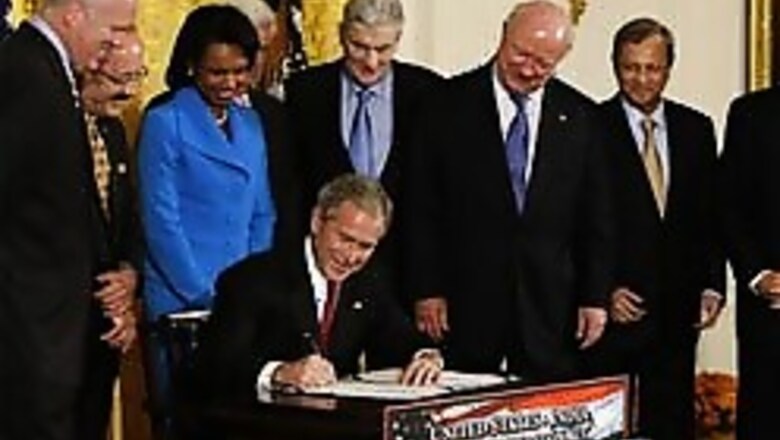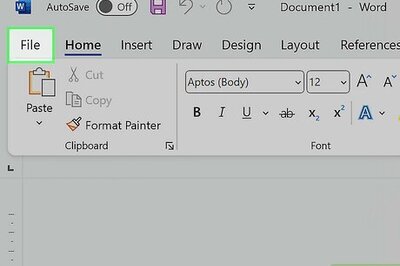
views
Washington: US President George W Bush on Wednesday signed into law the legislation to implement the Indo-US civil nuclear deal with an assurance there is no change in fuel supply commitments as reflected in the 123 Agreement.
“This is a big deal,” said Bush as he signed the “H.R. 7081, the United States-India Nuclear Cooperation Approval and Non-proliferation Enhancement Act” at 2:34 p.m. (00:04 a.m. Thursday India time) in the East Room of the White House.
Vice President Dick Cheney, Secretary of State Condoleeza Rice and Indian Ambassador to the US Ronen Sen were among the dignitaries who witnessed Bush sign the historic law that would allow resumption of nuclear commerce between the two countries after three decades.
Also attending were prominent members of the Indian-American community, captains of industry, lawmakers, diplomats and officials, who played a major role in getting the deal through the Congress in less than a month after the Nuclear Suppliers Group (NSG) gave India a waiver on nuclear trade.
Bush thanked members of his administration, especially at the State Department and White House who worked to secure the deal, lawmakers and leaders of the Indian American community.
He especially appreciated Rice for her "hard work" in bringing the deal to fruition.
Rice and External Affairs Minister Pranab Mukherjee will now formally ink the 123 Agreement on Friday to give effect to the landmark accord, envisioned by Bush and Prime Minister Manmohan Singh on July 18, 2005.
Fuel supply assurance
In significant comments at the signing ceremony, Bush assured there would be no changes in fuel supply commitments as contained in the 123 Agreement. "India can count on reliable fuel supplies (from US) for its reactors," Bush said.
"The legislation does not change fuel supply commitments made by the US to the Government of India as recorded in the 123 Agreement," Bush said as he put his signature on the nuclear bill.
PAGE_BREAK
"India can count on reliable fuel supplies (from US) for its reactors," Bush said, adding: "we will give consent to India for advanced reprocessing."
India had expressed concern regarding nuclear fuel assurances, technology transfers for uranium enrichment and reprocessing of spent nuclear fuel.
The historic agreement could not be inked during Rice's daylong visit to India on October 4 as New Delhi insisted that it would do so only after seeing Bush's signing statement.
India expected Bush to clear the American position on certain aspects like fuel supply commitments and it is not immediately clear if there is a formal signing statement after the deal was signed into a law to lend weight to his assurances.
Celebrating "the growing ties between the world's two largest democracies", Bush said "This agreement sends a signal to the world: Nations that follow the path to democracy and responsible behavior will find a friend in the United States of America."
"Today I have the honour of signing legislation that builds on the growing ties beween the world's two largest democracies," he said.
"Even though the United States and India are separated by half the globe, we are natural partners as we head into the 21st century," Bush said.
The Presidential action culminates a over three-year tumultuous journey for the deal which faced opposition from lawmakers in both the two countries that also saw Left parties withdrawing support to the Prime Minister Manmohan Singh Government.



















Comments
0 comment